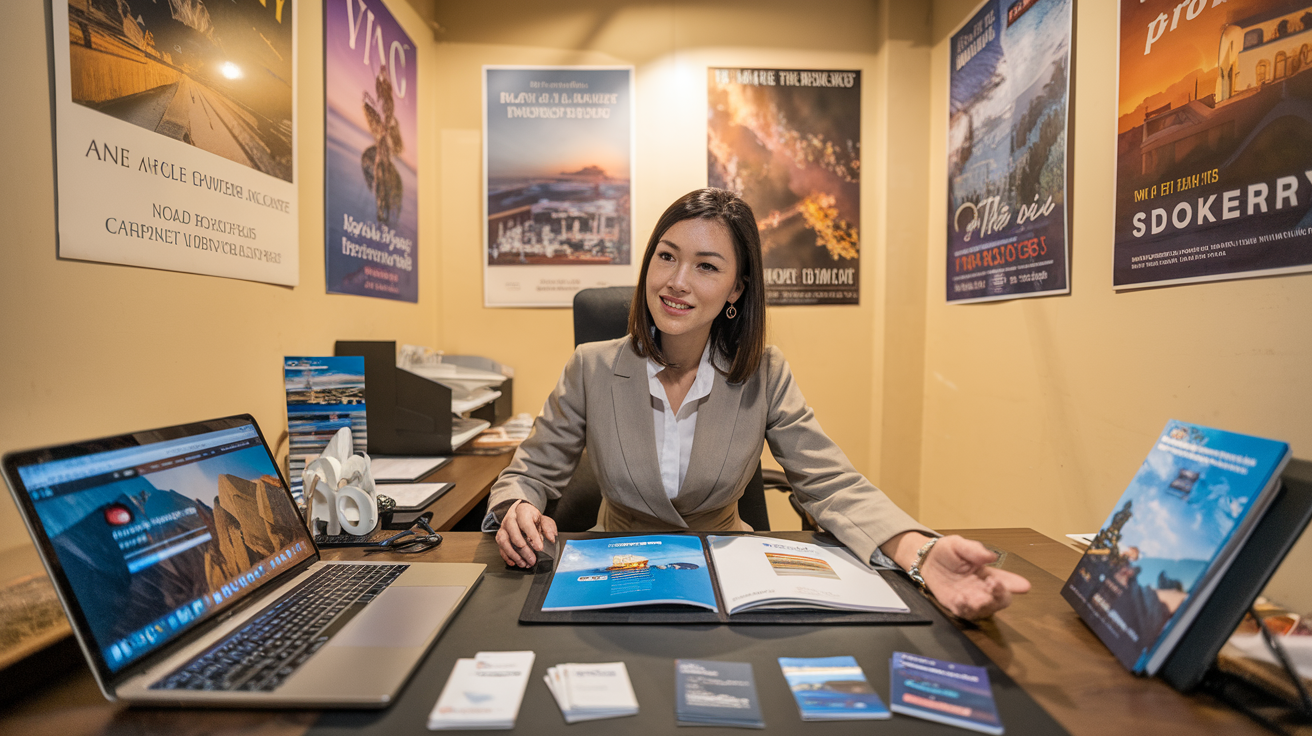How to Become a Travel Agent in 5 Easy Steps
Contents
- 1 Ever wonder what happens when wanderlust meets career opportunity? Just last year, over 105,000 travel agents helped millions turn vacation dreams into reality—and they’re making good money doing it.
- 2 Assess Your Passion and Skills for the Travel Industry
- 3 Acquire Relevant Education and Certification
- 4 Gain Practical Experience in the Travel Sector
- 5 Choose Your Business Model and Establish Your Presence
- 6 Launch and Grow Your Travel Agent Business
Ever wonder what happens when wanderlust meets career opportunity? Just last year, over 105,000 travel agents helped millions turn vacation dreams into reality—and they’re making good money doing it.
Want to join their ranks? Learning how to become a travel agent isn’t just about booking flights. It’s about crafting experiences that change lives while building a flexible career you control.
The travel industry is bouncing back stronger than ever, with consumers craving expert guidance through the increasingly complex world of travel options. They’re willing to pay for someone who knows the hidden gems, navigates the fine print, and rescues trips gone sideways.
But here’s what most people don’t realize about starting a travel agency business…
Assess Your Passion and Skills for the Travel Industry

Dreaming about helping others plan amazing vacations isn’t enough to become a successful travel agent. You need to take a hard look at your actual travel experience first.
Have you visited multiple countries? Do you specialize in specific destinations like Europe or Southeast Asia? Maybe you’re knowledgeable about certain types of travel – luxury cruises, adventure backpacking, or family-friendly resorts.
Your personal travel history is your secret weapon. Clients trust agents who’ve actually walked the beaches they’re recommending. Make a list of everywhere you’ve been, what you loved, and what you’d recommend to others. This becomes your initial specialty area when starting out.
Don’t panic if your passport doesn’t have many stamps yet. Some of the best agents focus on domestic destinations they know inside and out. Quality beats quantity every time.
Evaluating your customer service capabilities
Travel agents are essentially professional problem-solvers with a smile. You’ll spend hours dealing with client questions, concerns, and sometimes full-blown travel emergencies.
Ask yourself:
-
Do you genuinely enjoy helping people?
-
Can you stay calm when flights get canceled at midnight?
-
Are you patient enough to explain the same visa requirements three different ways?
-
Will you happily rework an entire itinerary because your client suddenly changed their mind?
The brutal truth is that travel planning involves countless details and unexpected changes. If you get frustrated easily or hate being interrupted, this career might be your personal nightmare.
Test your customer service skills by planning a trip for friends or family first. Their feedback will tell you if you’ve got what it takes.
Analyzing your sales and marketing aptitude
Sugar-coating time is over. Travel agents are salespeople. You’ll need to:
-
Convince potential clients to book with you instead of doing it themselves online
-
Upsell trip insurance, premium experiences, and upgraded accommodations
-
Market yourself consistently through social media, networking, and referrals
Most new agents fail because they’re fantastic at planning trips but terrible at finding paying clients.
Rate your comfort level with selling from 1-10. If you scored below a 7, start developing these skills immediately through practice conversations, online courses, or sales books.
The good news? You’re selling something people actually want. Nobody needs to be convinced that vacations are awesome.
Testing your problem-solving abilities
Travel disasters happen constantly. Flights get canceled. Passports go missing. Hotels lose reservations. Your value as an agent comes from how smoothly you handle these inevitable crises.
Try this quick exercise: Imagine your client is stranded in a foreign country after missing their connection. The next available flight is in two days. Their hotel reservation ended today, and everything nearby is booked solid for a festival.
What would you do? How many solutions can you generate in five minutes?
Strong problem-solving skills require:
-
Quick thinking under pressure
-
Creative alternatives when plan A fails
-
Detailed knowledge of travel systems and policies
-
A network of industry contacts to call for favors
If solving complex travel puzzles energizes rather than exhausts you, that’s a promising sign you’re cut out for this business.
Acquire Relevant Education and Certification

Ever wondered why some travel agents seem more credible than others? It’s all about proper education. When you’re serious about becoming a travel agent, you need to start by finding programs that actually mean something in the industry.
The Travel Institute and the American Society of Travel Advisors (ASTA) offer respected programs that agencies actually recognize. Don’t just Google “travel agent course” and pick the first result. That’s like booking a hotel without reading reviews—recipe for disaster!
Look for programs that:
-
Have industry recognition
-
Include hands-on booking system training
-
Offer job placement assistance
-
Provide ongoing education opportunities
-
Connect you with established travel professionals
Ask current travel agents about their training path. Most are happy to share what worked (and what was a complete waste of time and money).
B. Choosing between online courses and traditional education
The big question: online or classroom? Both have their perks, and I’m going to break it down for you.
Online courses give you flexibility—perfect if you’re juggling a job while preparing for your travel career switch. You can learn at midnight in your pajamas if that’s your thing.
Traditional classroom settings offer networking gold. You’re physically connecting with instructors who have industry contacts and classmates who might become future colleagues.
Here’s the honest comparison:
| Online Courses | Traditional Education |
|---|---|
| Learn at your own pace | Structured schedule keeps you accountable |
| Often less expensive | More hands-on practice with booking systems |
| Can be completed faster | Better networking opportunities |
| Might miss real-world scenarios | Immediate feedback from instructors |
| Requires self-discipline | Built-in study groups and support |
Many successful agents tell me they did a mix of both—an online foundation course followed by in-person workshops for specific skills.
C. Understanding industry-specific certifications (IATA, CLIA, etc.)
Think of certifications as your travel agent superpowers. They’re not just fancy acronyms to put after your name (though that part is pretty cool).
The International Air Transport Association (IATA) number is practically your industry ID card. Without it, you’ll struggle to book with major airlines and earn those sweet commissions.
Cruise Lines International Association (CLIA) certification shows cruise lines you know your port from your starboard. It opens doors to higher commission levels and specialty cruise bookings.
Other certifications worth considering:
-
Destination Specialist (DS) certifications for specific regions
-
Certified Travel Associate (CTA)
-
Certified Travel Counselor (CTC)
-
Accredited Cruise Counselor (ACC)
Each certification unlocks different supplier relationships and commission structures. The travel agents making six figures? They’re usually sporting multiple certifications that help them specialize.
D. Estimating time and financial investment
Nobody likes talking about this part, but let’s get real about the costs.
Starting your travel agent education isn’t like paying for medical school, but it’s not pocket change either. Entry-level programs typically range from $300-$800, while comprehensive certification paths can reach $2,000-$5,000 over time.
Time-wise, you’re looking at:
-
Basic travel agent course: 3-6 months (part-time)
-
Specialty certifications: 1-3 months each
-
Building enough knowledge to be truly confident: 1-2 years
One travel agent told me, “I spent about $2,500 on education my first year, but made it back within three months once I started booking luxury honeymoons.”
Smart money move: Many host agencies will reimburse your education costs or offer discounted training programs when you affiliate with them.
E. Leveraging free educational resources
Not ready to drop big money yet? Smart thinking. Test the waters with these free resources first:
Travel supplier training programs are gold mines of free education. Airlines, hotel chains, and tour operators offer complimentary courses to teach you about their products. These aren’t just sales pitches—they contain valuable industry insights.
YouTube channels run by successful travel agents provide real-world tips you won’t find in textbooks. Subscribe to a few and watch between commutes.
Tourism board webinars teach you destination knowledge that impresses clients. Sign up for their travel agent newsletters to get invites.
Travel industry podcasts let you learn while driving or working out. “Travelpreneur” and “Travel Agent Chatter” are packed with actionable advice.
Facebook groups for aspiring travel agents offer community support and answered questions. Just watch out for the sales pitches disguised as advice.
The best part? These free resources help you decide if this career truly fits before investing serious cash.
Gain Practical Experience in the Travel Sector

Want to know the fastest way to break into the travel industry? Get your foot in the door with an internship. Real talk – established agencies are always on the lookout for eager newbies they can train up.
Start by tapping into job boards like TravelJobSearch, Hcareers, and even LinkedIn. But here’s a little secret – many great internships never make it to these platforms. Pick up the phone or slide into the DMs of local travel agencies. Ask if they’d be open to taking you on, even if it’s just for a few hours a week.
Professional associations like ASTA (American Society of Travel Advisors) often have job boards with internship listings. Become a student member and you’ll get access to networking events where you can meet agency owners face-to-face.
Developing destination expertise through personal travel
Nothing beats firsthand experience. Period. Clients can smell the difference between someone who’s Googled a destination and someone who’s actually been there.
Keep a detailed travel journal during your trips. Note hotel amenities, restaurant recommendations, hidden gems, and transportation tips. Take photos (lots of them) and create content you can use later when recommending destinations.
Many suppliers offer “fam trips” (familiarization trips) at deeply discounted rates for travel professionals. While you might need some credentials to qualify for these, they’re gold for building your expertise quickly.
Building relationships with travel suppliers and vendors
The travel business runs on relationships. Those connections with hotel reps, tour operators, and cruise lines? They’re your secret weapon.
Make it a point to attend travel trade shows like Travel Industry Exchange or the New York Times Travel Show. Suppliers are there specifically to meet travel professionals like you. Grab business cards, schedule follow-up calls, and start building your network.
Join Facebook groups for travel professionals where suppliers often post updates and special offers. Groups like “Travel Agent Community” have thousands of members sharing supplier contacts and advice.
Practicing booking systems and reservation tools
Booking tools are the nuts and bolts of your future career. Get comfortable with them now.
Most major Global Distribution Systems (GDS) like Sabre, Amadeus, and Travelport offer training modules – many for free or at low cost. Complete these certifications before applying for jobs, and you’ll immediately stand out.
Cruise lines, tour operators, and hotel chains offer their own training programs. Disney’s College of Knowledge, Royal Caribbean’s University of WOW, and Sandals’ travel agent portal all provide free training on their booking platforms.
Set up practice scenarios and book mock itineraries from start to finish. Get familiar with reading fare rules, understanding cancellation policies, and troubleshooting common booking issues.
Choose Your Business Model and Establish Your Presence

The age-old question every aspiring travel agent faces: go solo or join forces with an established agency?
Working independently gives you complete freedom. You call the shots on which clients to work with, which destinations to promote, and how to structure your business. But that freedom comes with responsibilities—you’ll handle everything from marketing to accounting.
On the flip side, affiliating with an agency provides instant credibility and support. You’ll get access to established booking systems, training resources, and higher commission levels right off the bat. Many agencies offer split commission models ranging from 70/30 to 90/10 depending on your experience and sales volume.
Here’s a quick comparison:
| Independent Agent | Agency Affiliation |
|---|---|
| Complete control | Built-in support systems |
| Keep all profits | Split commissions |
| Build your own brand | Leverage established reputation |
| Higher startup costs | Lower entry barriers |
| No sales quotas | Potential performance requirements |
The right choice boils down to your personality and goals. If you’re entrepreneurial and crave independence, going solo might be your path. If you value mentorship and infrastructure, an agency affiliation could fast-track your success.
Selecting a profitable travel niche (luxury, adventure, corporate, etc.)
The days of being a one-size-fits-all travel agent are long gone. The most successful agents today specialize in specific niches.
Finding your travel niche isn’t just about following passion—it’s about identifying where demand meets profitability. Luxury travel typically offers higher commission rates (10-15% versus the standard 5-10%), but requires deeper destination knowledge and premium connections.
Adventure travel attracts clients willing to spend on once-in-a-lifetime experiences, while corporate travel provides steady, repeat business. Destination weddings and honeymoons might offer seasonal peaks but deliver extremely loyal clients who refer their friends.
Ask yourself these questions when choosing:
-
What type of travel do I personally enjoy and know well?
-
Which segments have less local competition?
-
Where can I add unique value that online booking sites can’t?
-
Which client types match my personality and work style?
The most profitable niches in 2025 include sustainable travel, multi-generational family trips, wellness retreats, and exclusive small-group experiences. Each requires different skills, but all offer higher-than-average commissions and growth potential.
Don’t forget to research the earning potential before committing. Luxury safari specialists might earn $500-1,000 per booking, while budget Caribbean packages might net just $50-100.
Creating your professional brand identity
Your brand isn’t just a logo—it’s what clients think of when they hear your name. It’s the promise you make to travelers.
Start by crafting your unique value proposition. What makes you different from the thousands of other travel agents out there? Maybe you lived in Europe for a decade, or perhaps you specialize in accessible travel for clients with mobility challenges.
The most compelling travel agent brands center around:
-
Specific expertise (the Disney planning guru)
-
Personal style (the adventure-loving millennial agent)
-
Service approach (the ultra-responsive, 24/7 agent)
-
Client experience (the agent who sends personalized welcome-home gifts)
Your brand name matters too. While “Jane Smith Travel” is straightforward, something like “Far-Flung Adventures” or “Luxury Getaway Guru” immediately communicates your specialty.
Your visual identity—colors, fonts, photography style—should match your target clients’ aspirations. Serving luxury clients? Think elegant, minimalist design. Family travel specialist? Bright, friendly colors might work better.
The most successful travel agent brands aren’t trying to be everything to everyone. They proudly declare their specialty and attract ideal clients who value exactly what they offer.
Setting up your online presence and booking platform
In 2025, your online presence is your storefront. And it needs to work harder than a storefront ever did.
A professional website is non-negotiable, even if you’re affiliated with an agency. Your site should showcase your niche expertise, feature client testimonials, and make it dead simple to contact you. Include a booking inquiry form that captures all the details you need to start planning.
Beyond your website, you’ll need:
-
A client management system (CRM) to track leads and bookings
-
A booking engine that connects to major suppliers
-
Social media accounts where your ideal clients actually hang out
-
Email marketing tools for sending newsletters and promotions
For social platforms, don’t try to be everywhere. A luxury travel agent might focus on Instagram and Pinterest, while a corporate travel specialist could prioritize LinkedIn.
Your booking platform options range from agency-provided systems to independent solutions like Travefy, Umapped, or TravelJoy. Most cost between $25-100 monthly but save hours of manual work.
The tech might seem overwhelming, but remember: these tools exist to showcase your human expertise—the personalized service no online booking engine can match.
Establishing your fee structure and revenue model
Gone are the days when travel agents relied solely on supplier commissions. The most financially stable agents today use a hybrid revenue model.
Consider these income streams:
-
Planning fees: Charging $150-500 for comprehensive itinerary planning (often credited toward booking)
-
Service fees: Adding $25-75 per ticket for flight bookings
-
Consultation fees: $75-200 hourly for complex research
-
Supplier commissions: Typically 10-16% on packages, cruises, and tours
-
Membership programs: Annual fees ($250-1,000) for VIP service and perks
The right mix depends on your niche and client base. Luxury clients often prefer transparent fees in exchange for exceptional service, while budget travelers might be more fee-sensitive.
When setting your fees, research what other agents in your specialty charge, but don’t undersell yourself. New agents often make this mistake. If you provide genuine expertise and save clients time and stress, your services have real value.
Be upfront about your fee structure from the first client interaction. The best clients appreciate transparency and understand that “free” travel planning usually means compromised service or hidden costs elsewhere.
Launch and Grow Your Travel Agent Business

Ready to fill your client roster? The difference between struggling travel agents and thriving ones often comes down to one thing: a solid plan for finding customers.
Your first clients will likely come from people you already know. Friends, family, and colleagues who trust you are gold. Create a simple spreadsheet with everyone you know who travels, then reach out personally—not with a mass message.
Social media works wonders too, but pick your platforms wisely. Facebook groups for travelers or destination enthusiasts can be perfect hunting grounds. Don’t just pitch though—become a helpful resource first.
Remember this: specific niches attract more clients than trying to be everything to everyone. Maybe you specialize in:
-
Luxury honeymoons in the South Pacific
-
Adventure travel for seniors
-
Family-friendly European vacations
-
Solo female travelers heading to Southeast Asia
When someone asks what you do, “I’m a travel agent” gets polite nods. But saying “I help busy professionals plan luxury African safaris without the stress of research” makes people remember you.
Track where your leads come from religiously. After six months, you’ll see patterns—double down on what’s working and ditch what isn’t.
Crafting compelling travel packages and offers
Generic vacation packages are everywhere. Your custom-crafted offers need to scream “you can’t get this anywhere else!”
The secret sauce? Adding exclusive elements that online booking sites can’t match:
-
Private guided tours with locals who never advertise online
-
Restaurant reservations at spots that are “impossible” to book
-
Welcome packages with personalized touches based on client preferences
-
Behind-the-scenes access to attractions
Price your packages strategically. If every offer sits at the same price point, you’re missing opportunities. Create good-better-best tiers that allow clients to self-select their comfort level.
Timing matters tremendously. Create seasonal packages that align with both destination peaks and booking windows. Most travelers research trips 3-5 months before departure—have your best offers ready when they’re searching.
Test your packages on friends first. If their eyes light up when you describe it, you’re onto something. If they nod politely, back to the drawing board.
Building your professional network within the industry
The travel industry runs on relationships. Those connections will save your clients’ trips when things go sideways (and they will).
Start building your supplier network by:
-
Attending local travel industry meetups (search Meetup.com and Facebook)
-
Joining travel agent associations like ASTA or Travel Leaders Network
-
Participating in hotel and cruise line training programs
-
Connecting with destination marketing organizations
Don’t just collect business cards. Actually follow up with personalized messages referencing your conversation. Most agents don’t bother, which makes you instantly memorable.
Supplier relationships work both ways. The more business you send them, the more they’ll bend over backward for your clients. Start tracking which suppliers give you:
-
Quick response times during emergencies
-
Willingness to make exceptions to policies
-
Better-than-published rates
-
Special amenities for your clients
These connections become your secret weapon when crafting irresistible packages.
Implementing effective marketing tactics
Marketing doesn’t need to break the bank when you’re starting out. The most effective strategies focus on consistency rather than flashiness.
Content creation builds your authority. Start a simple blog focusing on your niche destinations or travel styles. Answer the questions your ideal clients are asking. A post like “What to Pack for Alaska in September” might seem basic to you, but it’s exactly what travelers are searching for.
Email marketing outperforms social media for travel agents by a mile. Start collecting emails immediately with a lead magnet—perhaps a destination guide or packing checklist. Then nurture those leads with weekly travel inspiration and occasional offers.
Client testimonials and reviews are marketing gold. Create a simple system:
-
Send a welcome home email asking about their experience
-
Request a specific review highlighting what made your service special
-
Ask permission to use their stories in your marketing
Partner marketing can double your reach overnight. Find complementary businesses (photographers, luggage stores, travel clothing boutiques) and create cross-promotional offers.
The most powerful marketing tactic? Dramatically exceeding client expectations. When someone is genuinely delighted, they tell everyone they know.

The travel industry continues to evolve, but the need for knowledgeable, personalized service remains constant. Whether you choose to join an established agency or start your own independent business, remember that building relationships with both clients and industry partners is key to long-term success. Start your travel agent journey today and transform your passion for travel into a fulfilling career helping others discover the world while creating a flexible, sustainable business for yourself.

